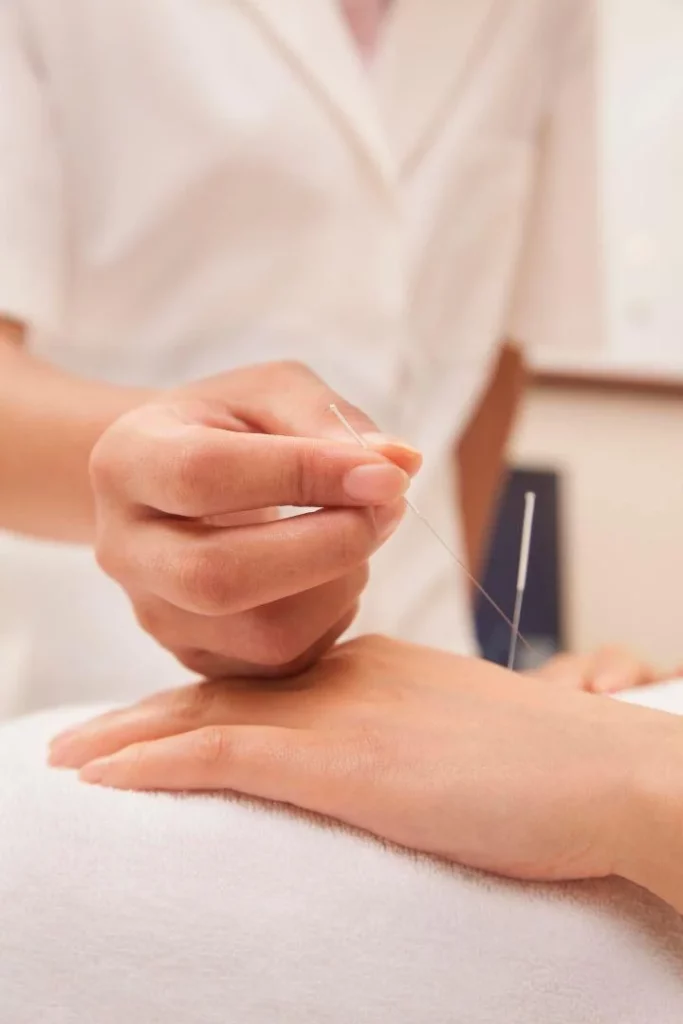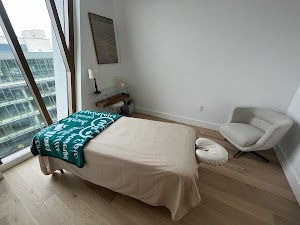Acupuncture for Stress
Acupuncture for Stress
What is Stress?

Stress is a reaction your body has to challenges or unusually high demands. When something new or threatening happens, your body responds by releasing chemicals into the blood. These chemicals give people more energy and strength, which can be a good thing if their response is needed for a quick action. However, stress can be harmful if it lasts too long and one does not get some breaks from it.
When you feel stressed, your nervous system responds by releasing stress hormones like adrenaline and cortisol. These hormones rouse the body for emergency action.
Your heart pounds faster, muscles tighten, blood pressure rises, breath quickens, and your senses become sharper. These physical changes increase your strength and stamina, speed your reaction time, and enhance your focus – preparing you to either fight or flee from the danger at hand.
Main Types of Stress
There are several categorizations of stress types, but mostly it narrows to mainly three types of stress:
- Acute Stress. This is short-term stress that goes away quickly. It helps you manage dangerous situations. It can also occur when you do something new or exciting. All people experience acute stress at one time or another.
- Episodic Acute Stress. Some people can have acute stress frequently. This happens when someone often finds themselves rushing about or having a chaotic life. This type of stress can make them feel like they are always in a rush and can’t get everything done.
- Chronic Stress. This stress lasts for a longer period of time. It may result from ongoing life challenges that seem endless. Chronic stress can be harmful to health because it wears the body down over time.
Each type affects people differently, impacting how they feel and act in daily situations.
Common Signs of Stress
Common signs of stress can be divided into physical, emotional, and behavioral categories.
Physical Signs:
- Headaches and muscle tension or pain.
- Chest pain and a faster heartbeat.
- Feeling tired or having trouble sleeping.
- Digestive issues and changes in appetite.
- Increased susceptibility to illnesses due to a weakened immune system.
Emotional Signs:
- Feelings of anxiety, irritability, or depression.
- Feeling overwhelmed or unmotivated.
- Mood swings and restlessness.
Behavioral Signs:
- Changes in eating habits, either eating too much or too little.
- Withdrawing from social interactions.
- Increased use of alcohol, tobacco, or other drugs as a way to cope.
These symptoms can occur in various combinations and intensities, depending on the individual and the duration of stress they are experiencing.
If You Are Worried About Stress, Make An Appointment With Us!
What Causes Stress?

Here are some common causes:
- Work-Related Stress. This includes having too much work, job insecurity, conflicts at work, or not enjoying your job. Work stress can lead to both physical and psychological symptoms like headaches, anxiety, or mood changes.
- Personal Relationships. Stress in personal relationships can come from issues with family members, partners, or friends. This includes conflict, feeling neglected, or coping with negative changes in the relationship. Social media interactions can also add to this stress by causing feelings of inadequacy or facilitating bullying.
- Life Changes. Significant life events such as moving, changing jobs, or major family changes can be stressful. Even positive changes require adjustments and can cause stress.
- Financial Stress. Worrying about money, whether it’s due to debt, insufficient income, or unexpected expenses, is a significant stressor for many. This type of stress can affect your physical health, leading to symptoms like high blood pressure or even diabetes, in worst cases.
- Health and Well-being. Personal health issues or caring for someone who is ill can lead to prolonged stress. This includes dealing with chronic diseases, injuries, or disabilities.
Understanding these sources can help in managing stress more effectively by identifying specific stressors and addressing them directly.
How is Stress Treated?
Stress treatment focuses on managing the symptoms and finding ways to reduce the stress itself. No single treatment works for everyone, so a combination of methods is usually recommended. Here are some common approaches:
- Talking Therapy. Speaking with a therapist can help you understand and manage your stress. This includes therapies like cognitive-behavioral therapy (CBT) which helps modify thought patterns associated with stress.
- Medication. While there is no specific medication for stress, doctors may prescribe medications to help manage symptoms of stress such as anxiety or sleep problems.
- Relaxation Techniques. Methods like meditation, yoga, and deep breathing exercises can activate the body’s relaxation response and help ease stress.
- Physical Activity. Regular exercise can improve mood and reduce stress. Even short walks can sometimes help.
- Lifestyle Changes. Eating a balanced diet, getting enough sleep, and maintaining social connections can also help manage stress.
Additionally, acupuncture for stress is another method that can be used, offering an alternative approach that involves stimulating specific pressure points for stress on the body to relieve stress symptoms.

Each person may respond differently to these treatments, so it’s important to find a combination that works best for you personally. It’s always a good idea to consult with a healthcare provider to create a treatment plan for your specific needs.
The Benefits of Acupuncture for Stress
Acupuncture is known for its effectiveness in reducing stress and managing anxiety by targeting specific acupuncture points for stress. This ancient Chinese practice involves inserting thin needles into the body at strategic points to promote relaxation. Acupuncture for stress management works by calming the nervous system, reducing cortisol levels, and promoting the production of endorphins, which are natural mood lifters.
One of the key mechanisms by which acupuncture for anxiety helps is through the stimulation of the body’s energy pathways, or meridians, which can lead to a state of balance and calm. Common acupuncture points for stress include areas that are known to relieve tension headaches, improve sleep quality, and ease muscle tension.
Research suggests that acupuncture can be a valuable part of stress treatment, providing relief from both the physical and emotional aspects of stress. It’s also been noted that acupuncture can be safely integrated with other treatments, such as medication, to manage symptoms even more effectively. But even on its own, acupuncture for stress is a powerful tool.
If you’re considering acupuncture for stress or anxiety, it’s essential to consult with a licensed practitioner to ensure the best approach to your health needs.
Relieve Stress with Pulse Acupuncture in Williamsburg, Brooklyn and Clifton, NJ
At Pulse Acupuncture in Williamsburg, Brooklyn, and Clifton, NJ, stress management takes a holistic turn under the care of Marina Doktorman, L.Ac. We specialize in relieving stress through traditional Chinese practices, including acupuncture, Chinese herbs, and aromatherapy – inspiring your mind by inspiring the senses.
The advantages of choosing acupuncture for stress relief at Pulse Acupuncture are many. Acupuncture, specifically, involves the precise placement of needles at acupuncture points for stress, which helps to restore balance to the body’s energy flow and ease stress symptoms. Adding Chinese herbs and aromatherapy makes the treatment even more effective.
Acupuncture in Brooklyn, NY, at our center offers a fully personalized treatment plan that addresses individual stress-related symptoms, so that each client receives the most effective care. Our approach helps our patients achieve a better state of mental and physical health.
-

Marina Doktorman, M.S., L.Ac., is an experienced acupuncturist who obtained her Masters of Acupuncture from the Tri-State College of Acupuncture in New York City in 2001. During her studies, she focused on Chinese Herbology, a branch of Traditional Chinese Medicine (TCM) that utilizes herbs to complement acupuncture treatments. Marina is licensed in both New York (NY) and New Jersey (NJ) and holds a Diplomate of Acupuncture from the National Certification Commission for Acupuncture and Oriental Medicine (NCCAOM), indicating her expertise in the field.
Why Pulse Acupuncture?

Experience
Marina Doktorman, L.Ac. has over 20 years of clinical experience.

RELAXATION
At Pulse Acupuncture, we aim to cultivate a spa-like environment.

Comfort
All of our needles are of the highest quality for painless insertion.
Patient Reviews in Brooklyn

Acupuncture for Stress - FAQ
How does acupuncture help with stress?
Acupuncture is believed to influence the body’s nervous system, reducing stress hormones, enhancing circulation, and promoting relaxation. It may help regulate serotonin and endorphin levels, which can improve mood and reduce feelings of stress.
Is acupuncture safe for managing stress?
Yes, when performed by a licensed practitioner, acupuncture is generally safe. Common side effects are minimal and may include soreness, minor bleeding, or bruising at the needle sites.
What can I expect during an acupuncture session for stress?
During your session, you’ll typically lie down in a quiet, relaxing environment. The practitioner will insert needles at specific points, which might be distant from where you perceive your stress. Needles are usually kept in place for about 20-30 minutes.
What are some tips to enhance the benefits of acupuncture for stress?
Combine acupuncture with other stress-reduction techniques such as yoga, meditation, or regular exercise. Maintaining a healthy diet and getting adequate sleep also enhances your overall stress management.
Contact us
Acupuncture therapy at Pulse Acupuncture Practice, at Clifton, NJ and Williamsburg, Brooklyn, NYC offers unique combination of various cupuncture types for healing on all levels: emotional, spiritual and physical by integrating ancient wisdom of energy healing with modern acupuncture techniques.



















